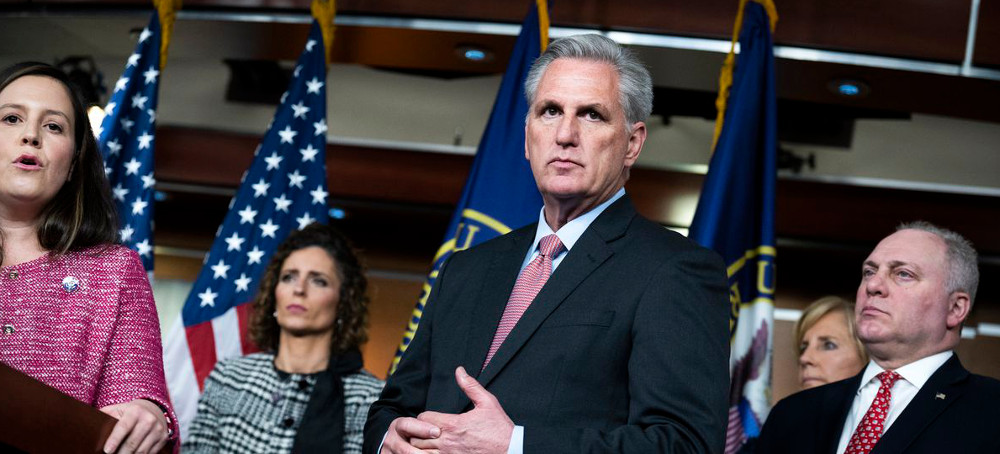
11 November 22
Live on the homepage now!
Reader Supported News
WHAT RSN DONATED TO THE DEMOCRATS IN OCTOBER — Overall fundraising declined by 30% in October, apparently due to our donors directing their donations to Democratic Midterm efforts. That amounts to loss of about $4,000 in operating capital for RSN. So RSN donated $4,000 to the Democrats in October. That’s great, that’s fine, we need to recover now. Who can donate?
Marc Ash • Founder, Reader Supported News
Sure, I'll make a donation!

Asawin Suebsaeng and Nikki McCann Ramirez | We 'Sh!t the Bed So Bad.' The GOP Post-Midterm Meltdown Has Begun
Asawin Suebsaeng and Nikki McCann Ramirez, Rolling Stone
Excerpt: "The Republican Party “shit the bed so bad” on Tuesday night. That’s how one longtime GOP strategist who worked on several high-profile 2022 races put it just hours after midnight."
“If we can’t win under these circumstances, when can we win?” one Republican megadonor asked
The Republican Party “shit the bed so bad” on Tuesday night.
That’s how one longtime GOP strategist who worked on several high-profile 2022 races put it just hours after midnight. The operative wasn’t alone in his misery: A total of 16 Republican strategists, grassroots activists, Donald Trump confidants, and elected officials began venting to Rolling Stone Tuesday night (some completely unprompted) about the party’s disappointment midterm results. The general sentiment: The GOP had historically botched the midterms, had good reason to panic, and should feel humiliated.
“What the fuck is happening???” one veteran Republican consultant asked in the middle of the night. Other notable or recurring messages from the rest of the 16 included “holy shit,” “oh no,” a floating-dumpster-fire GIF, a sardonic “STOP THE COUNT” pronouncement, the “Hellmo” meme, “the blame games for this [are] going to be crazy,” “Not good!,” and “what a disaster.”
The shock and, at times, devastation reflect the missed expectations of the GOP elite, conservative movement leaders, and Trump’s own inner orbit. After months of crowing about the coming midterm “bloodbath,” Republicans watched as several candidates — including some MAGA favorites — were dispatched by their Democratic opponents.
On Wednesday, the balance of power in both chambers of Congress remained up in the air. And across the board, the performance of Trump-backed candidates failed to meet conservative expectations, which had been further inflated by weeks of favorable polling results in the campaigns’ final stretch. Three MAGA candidates for governorships — Doug Mastriano in Pennsylvania, Tudor Dixon in Michigan, and Tim Michael in Wisconsin — lost their bid for election. In Georgia, Trump’s pick for Senate, Herschel Walker, is now headed to a runoff with incumbent Sen. Raphael Warnock. J.D. Vance scored a narrow victory in his Senate race in Ohio, but ran well behind the 25-point margin of victory secured by GOP Gov. Mike DeWine.
For Trump, the pain was particularly acute in Pennsylvania, where Trump’s team had planned election challenges and a “dress rehearsal” for 2024. In the Senate race, Lt. Gov. John Fetterman managed a narrow victory over celebrity TV doctor Mehmet Oz, whom Trump had supported. And in the governor’s contest — a race with real implications for the 2024 election — Mastriano lost to Democrat Josh Shapiro by double digits.
At Mar-a-Lago, where Trump had hosted what was supposed to be a triumphant watch party on Election Night, the twice-impeached ex-president was seething. According to a source familiar with the matter, Trump was privately ranting about Oz. Among Trump’s many complaints: Oz’s amateurish campaigning and the TV doctor’s inability to win “big” against an opponent who had a stroke.
Trump may have seen some of this coming. Over the summer, he confided in some of those close to him that he was starting to think Oz was going to “fucking lose,” as Rolling Stone reported at the time. In more recent months, Trump (whose own inability to accept his 2020 loss to President Joe Biden led to the deadly Jan. 6 Capitol assault) huddled with various attorneys and right-wing organizations that were laying groundwork for challenging the legitimacy of 2022 elections — especially if there ended up being a tight race in Pennsylvania. At this point, it is unclear to what extent these plans, for Oz or any other candidate, will be executed.
As of early afternoon on Wednesday, it was also unclear whether Trump would publicly accept the disappointing results, or if he would try to regurgitate his “fraud” lies that dominated the aftermath of the 2020 election. “The [former] president is still weighing his options and how all-in he will go on challenging certain races,” says a person with knowledge of the state of play. “Right now, I don’t know. Just know that he is livid today.”
Trump is also focusing on preserving his own standing in the Republican Party. Another person familiar with the situation says the ex-president is now adamantly keeping track of which GOP figures try to blame him during the fallout from the midterms, and which prominent Republicans begin to seriously inch away from him and toward possible 2024 rivals like Florida Governor Ron DeSantis.
“Democrats overperformed,” says Sen. Lindsey Graham (R-S.C.), a top Trump ally and one of numerous conservative politicians and operatives who predicted a massive “#RedWaveComing.” During a brief phone call with Rolling Stone, Graham also suggested the results will give an unchastened President Biden more confidence in pursuing his policy agenda.
There was no shortage of Republican lawmakers and party stalwarts who wanted to blame Trump for their misfortunes — though few would do so publicly for fear of retribution from Trump, who remains the leader of the GOP and has retained mega-popularity among Republican voters. On Wednesday, Sam Nunberg, a former political advisor to Trump, simply texted Rolling Stone a photo of Trump waving from a car, with the memed caption of: “GET IN LOSER, WE’RE GOING LOSING,” a clear reference to the 2004 Tina Fey-penned film, Mean Girls.
“It was a disaster,” says Ed Rollins, a veteran strategist who’s now with Ready for Ron PAC, but used to lead the pro-Trump Great America PAC. “The Democrats came back and beat us on the ground. We spent hundreds of millions of dollars on ads that didn’t work. We had inflation, we had the after-effects of Covid, we had an unpopular president — and we sat around fighting each other and name-calling … I’ve been in and around politics for 50 years, and this is one that was truly unpredictable and certainly should not have happened the way it did [for us].”
Or, as Dan Eberhart, chief executive at oilfield-services company Canary and a big Republican donor, puts it: “If we can’t win under these circumstances, when can we win?”
“I am gobsmacked. The red wave started and ended in Florida,” Eberhart said Wednesday morning. “The Democrats really beat the spread …The Republicans underestimated the priorities of suburban women in the voting booth. The Dobbs decision [which overturned Roe v. Wade loomed] large last night.”
Asked about what Trump should do following Tuesday’s results, Rollins replied: “If it was up to me, I’d say [to Trump], ‘Thank you very much for your service, you did a lot of good stuff, you brought the Republican Party out of the wilderness — it’s time to stay at Mar-a-Lago and play lots of golf.’ That’s what I would say. Even if he gets into the primary, which he probably will, and even if you gave him the presidency tomorrow, he still has all these legal liabilities. Could he even be a leader and take the country in a direction that we need to go?”
On social media, the anger and frustration with the former president’s brand of politics was palpable. The New York Post, Trump’s second-favorite Murdoch outlet, dedicated their Wednesday morning cover to DeSantis, branding him “DeFuture.”
READ MORE
 Imprisoned women wait to be escorted for work at a women's penal colony outside Orel, Russia on Nov. 30, 2011. (photo: Yuri Tutov/AP)
Imprisoned women wait to be escorted for work at a women's penal colony outside Orel, Russia on Nov. 30, 2011. (photo: Yuri Tutov/AP)
A Pussy Riot Member Describes What Brittney Griner Can Expect in Russian Penal Colony
Charles Maynes, NPR
Maynes writes: "This week, lawyers for jailed American basketball star Brittney Griner revealed she is currently on her way to a Russian penal colony to begin serving out her nine-year sentence on drug smuggling charges."
ALSO SEE: Sughnen Yongo-Okochi | Dear World, Don't Forget About Brittney Griner
This week, lawyers for jailed American basketball star Brittney Griner revealed she is currently on her way to a Russian penal colony to begin serving out her nine-year sentence on drug smuggling charges.
Which prison, exactly, is unknown. Neither is Griner's current location. Prisoner transfers often take several weeks, and only then are Russian authorities required to reveal a convict's whereabouts, Griner's legal team says.
Nearly half a million Russians are currently incarcerated— the highest number on the European continent, according to 2022 figures.
Yet those who have spent time in the system say Griner can expect an experience that is more aligned with the Soviet Union's past than most Americans' current ideas of criminal justice.
"If jail is possible to imagine, then a penal colony, you can only imagine reading dissidents' books," says Maria Alyokhina, who spent nearly two years in a colony following a protest performance in a Moscow church as a member of the renowned feminist punk collective Pussy Riot.
Alyokhina suggests reading Soviet writers like Alexander Solzhenitsyn, who indelibly captured the grim cruelty of the Soviet camps in his work The Gulag Archipelago.
There's also Alyokhina's own memoir Riot Days, which is also now a traveling live performance of her experiences in a prison colony in the Ural mountains.
"Of course it has a bit better conditions than [the] original gulag system from the 1950s," says Alyokhina, reached by NPR on tour in the United Kingdom. "But the sense is the same. It is a labor camp."
Aloykhina says while most Americans imagine prison cells with bars, Griner can expect to live in "the zone" — a set of barracks with 80 to 100 women sleeping to a room and few, if any, amenities.
"For 100 women, there are like three toilets and no hot water," says Alyokhina. Bathing is a once-a-week occurrence.
Most importantly, she says, in Russian prison colonies, all prisoners must perform forced labor.
"This is a really terrible institution which we received from [the] Soviet Union and it's totally inhuman. The cynical thing is, the work the state provides to the prisoners is sewing uniforms for Russian police and the Russian army," she says.
"This is a legal slavery system. There's nothing about correction or improvement of people's behavior," she adds.
Aloykhina's advice for Griner and her supporters is to keep the pressure on
Speaking at the White House on Wednesday, President Biden reaffirmed his desire to reengage the Kremlin in discussions over a potential prisoner exchange.
"My intention is to get her home, and we've had a number of discussions so far, and I'm hopeful that now that our election is over, there's a willingness to negotiate more specifically with us," said Biden. "I am determined to get her home and to get her home safely."
In the meantime, the president has tasked his administration to "prevail on her Russian captors to improve her treatment and the conditions she may be forced to endure in a penal colony," according to administration officials.
But Aloykhina suggests Griner is unlikely to receive special treatment once in the colony.
"It doesn't matter the citizenship of the prisoner," she says.
Asked what advice she would give to Griner, Aloykhina says, "It's important to not forget yourself and not lose your freedom. Because this is what the system teaches you. They teach you how to forget your right to choose."
For Alyokhina, that freedom would come from studying prisoner rights. She levied complaints that eventually led to the dismissal of eight guards for prisoner abuse, she tells NPR.
Together with her bandmate Nadia Tolokonnikova, Alyokhina later founded MediaZona, a news website that covers human rights and prison justice, among other topics.
Alyokhina also offers advice for Griner's family and supporters.
"Write letters. Connect with her lawyers. Ask questions about her inside the system. Do not leave her alone," she says.
"This is what the prisoner administration is telling political prisoners. That they will be forgotten and nobody cares about them," she says.
In Pussy Riot's case, Alyokhina says the constant public attention gave her and her jailed bandmates leverage and power over the prison authorities.
"When they see the person is not forgotten, they start to be much more polite," says Alyokhina.
"This gives hope and protection."
READ MORE
 A handful of top privacy, security, and safety executives at Twitter have quit. (photo: Muhammed Selim Korkutata/Getty)
A handful of top privacy, security, and safety executives at Twitter have quit. (photo: Muhammed Selim Korkutata/Getty)
AJ McDougall | 5 Top Twitter Execs Quit in Elon Musk’s Most Chaotic Day Yet
AJ McDougall, The Daily Beast
McDougall writes: "A handful of top privacy, security, and safety executives at Twitter have quit in the last day, walking out amid the increasing chaos caused by the erratic behavior of new owner Elon Musk, according to multiple reports."
“This news will be buried in the return-to-office drama,” a company lawyer reportedly wrote in an internal message. “I believe that is intentional.”
Ahandful of top privacy, security, and safety executives at Twitter have quit in the last day, walking out amid the increasing chaos caused by the erratic behavior of new owner Elon Musk, according to multiple reports.
The departures of chief information security officer Lea Kissner, chief privacy officer Damien Kieran, and chief compliance officer Marianne Fogarty were first reported by Casey Newton and Zoë Schiffer, journalists for the tech blog Platformer, on Thursday morning.
Hours later, Platformer reported the exit of Yoel Roth, the company’s moderation and safety leader, who had led the push to reassure rattled users that Twitter would not spiral into anarchy in Musk’s hands.
Some right-wing commentators had implored Musk to fire Roth as soon as the billionaire took over due to old tweets Roth had penned in which he called former President Donald Trump a “racist tangerine.” But Musk said he supported Roth, praising his “high integrity” and urging Twitter users to follow him for “the most accurate understanding of what’s happening with trust … safety at Twitter.” Roth, in turn, had been publicly supportive of Musk in the days after the shock takeover.
Head of client solutions Robin Wheeler, who led a headline-generating Twitter Spaces on Wednesday, was also out, according to Newton, who cited multiple unnamed sources. Wheeler had been tapped to smooth advertisers’ ruffled feathers on the hour-long livestream, pushing him to address content moderation and account verification practices.
Kissner confirmed her resignation in a Thursday morning tweet, while Kieran tweeted out a message that appeared to indirectly reference his own exit hours later. Several outlets, including The Washington Post, Bloomberg News, and The Wall Street Journal, confirmed the rest of Platformer’s reporting throughout the day.
“Twitter is on life support,” Axios reporter Sara Fischer tweeted, adding that employees were telling her they think “it’s over” because “trust is gone.”
On Thursday morning, tech outlet The Verge shared the entirety of a Slack message announcing some of the resignations, purportedly posted to an internal company channel by a senior member of Twitter’s legal team the previous night.
“This news will be buried in the return-to-office drama,” the unidentified lawyer wrote, likely referring to a dire email sent by Musk at 2:30 a.m. Thursday ordering everyone back into the office for a minimum of 40 hours a week. “I believe that is intentional.”
“Elon has shown that his only priority with Twitter users is how to monetize them,” the note continued, with its author going on to say they had “heard Alex Spiro (current head of Legal) say that Elon is willing to take on a huge amount of risk in relation to this company and its users, because ‘Elon puts rockets into space, he’s not afraid of the FTC.’”
A spokesperson for the Federal Trade Commission told The Verge that agents were “tracking recent developments at Twitter with deep concern.” The agency has indicated that it is prepared to take action to make sure the new Chief Twit will keep his company in compliance with a consent order established in a deal earlier this year, which allowed the platform to settle allegations of past misconduct around data handling practices.
Three of Thursday’s resignations were by members of a data governance committee formed as a result of the FTC settlement, a former employee told the Post.
Earlier on Thursday, Musk warned staffers on a call that bankruptcy wasn’t “out of the question” for Twitter, having indicated in his first email to its (remaining) staff that “there is a good chance Twitter will not survive the upcoming economic downturn” without a significant jump in subscription revenue.
A finding of noncompliance by the FTC could push the company into deeper financial straits, with possible fines reaching into the hundreds of millions of dollars.
READ MORE
 Mutulu Shakur in 2012. (photo: Family and Friends of Dr. Shakur)
Mutulu Shakur in 2012. (photo: Family and Friends of Dr. Shakur)
Natasha Lennard | Black Liberation Elder to Be Freed From Prison — but Only on His Deathbed
Natasha Lennard, The Intercept
Lennard writes: "Mutulu Shakur should have been released long ago, but the cruelties of carceral system know no bounds."
Mutulu Shakur should have been released long ago, but the cruelties of carceral system know no bounds.
Mutulu Shakur will not die in prison. Once he is free, though, he will only be free to die.
On Thursday, the U.S. Parole Commission’s confirmed that the Black liberation elder and stepfather of rapper Tupac will be permitted, after more than 36 years behind bars, to spend his final days outside of prison walls.
Shakur is dying of bone marrow cancer. His body and mind have deteriorated. In May, a Bureau of Prisons doctor said Shakur had less than six months to live. It was not until after an October hearing, however, that the federal parole commission — an antiquated institution that has denied the 72-year-old’s release 10 previous times — admitted the obvious: that the dying man, who has long posed zero risk to society and holds an impeccable institutional record, and who is considered a mentor to many, will likely not commit another offense and should be released.
Shakur’s belated release is a poignant example of the criminal punishment system’s breathtaking cruelty. While Shakur’s case turned on an obscure parole commission that today directly affects several hundred people, the broader forces behind his unnecessary and protracted imprisonment cast a shadow over America’s entire sprawling mass incarceration system.
The federal parole commission is not acting out of compassion. It is simply — and finally — following its own purported guidelines. Shakur had been gravely ill with terminal cancer in April, when the same parole commission denied his release; medical reports had also attested then to his decline in physical function, his confusion and hallucinations. Yet it was only with the further dramatic decline of his health that he has now been deemed eligible for freedom.
He will spend his remaining days in Southern California with his family.
Although long overdue, this is a result for which Shakur’s lawyers, family, and supporters have been fighting tirelessly, on numerous legal fronts, for many years.
“We are relieved that the Parole Commission now recognizes what has long been true — that Dr. Shakur’s release poses no risk whatsoever,” said one of Shakur’s attorneys, Brad Thomson of the People’s Law Office. “It is tragic that it took until he was on the verge of death for that truth to finally be realized.”
Shakur was convicted of racketeering conspiracy charges alongside several Black liberationists and leftist allies for his involvement in the 1981 robbery of a Brink’s armored truck, during which a guard and two police officers were killed. Shakur has taken responsibility for his actions and expressed remorse for the lives lost. He was also convicted for aiding in the prison escape of Assata Shakur.
Prior to his incarceration, Shakur was a member of the Black nationalist organization Republic of New Afrika. He was a renowned acupuncturist and a central figure in the movement to bring holistic health care and self-determination to Black residents in the Bronx in the 1970s — a struggle against the conditions of organized abandonment imposed on poor, Black communities under racial capitalism.
Freedom for longtime incarcerated Black liberation elders has always been hard won. Several aging former Black Panthers — like Herman Bell, Jalil Muntaqim, and Sundiata Acoli, who were imprisoned in state prison systems for all too many decades — were granted parole in recent years, despite the zealous opposition of powerful police unions. Shakur has faced the same systematic, ideological intransigence, plus further institutional blocks as a longtime prisoner in the federal rather than state system.
Shakur was incarcerated under a set of federal sentencing guidelines, known as “old law,” because he was convicted for crimes that took place before 1987, when the guidelines changed. As such, his parole decisions have been under the oversight of the U.S. Parole Commission: an outdated body consisting of just two decision-making commissioners that was intended to be phased out decades ago.
The new sentencing guidelines eliminated parole for defendants convicted of post-1987 federal crimes, decreasing the need for the commission. The commission’s very existence thus rests on the continued incarceration of fewer than 200 “old law” prisoners like Shakur, who are eligible for parole. There’s a grim vested interest in keeping these people in prison. With Shakur on the verge of death, however, it would have been an extreme violation of the commission’s own guidelines to deny parole once again.
According to the guidelines, the commission “shall” release any prisoner on mandatory parole if they have served two-thirds of their sentence, or 30 years of a sentence of more than 45 years, unless “he has seriously or frequently violated institution rules and regulations or that there is a reasonable probability that he will commit any Federal, State, or local crime.” Shakur more than qualifies; he has qualified for years.
“We now find your medical condition renders you so infirm of mind and body that you are no longer physically capable of committing any Federal, State or local crime,” noted the parole commission in its decision to grant Shakur’s release.
Grounds offered by the commission to deny Shakur’s release in the past have, as I’ve noted, been preposterous. The commissioners previously cited as a “serious violation,” for example, the fact that Shakur had been put on speakerphone during a phone call with a professor and her class in 2013, while they discussed his support for founding a truth and reconciliation commission in the United States.
Meanwhile, Shakur’s parole packet has been a glowing testimony to his character and the positive influence he has had on those incarcerated with him. “I recognize Dr. Mutulu Shakur not only as my father, but as the man who changed my way of thinking and saved my life,” Ra’ Sekou P’tah, who served 20 years in prison for a nonviolent drug crime before his sentence was commuted by President Barack Obama, wrote in a letter of support for Shakur’s parole. Dozens of letters detailing how Shakur has been a transformative force for his communities both within and beyond prison walls accompanied his parole application.
That Shakur has only been released on his deathbed did not come as a surprise. A judge who rejected his request for compassionate release in 2020 told him he should not expect anything less. The judge told Shakur that he could reapply at “the point of approaching death.” That same judge, now over 90 years old, was the one who sentenced Shakur to prison over 30 years ago.
In the end, Shakur’s release has been granted through the parole commission, not the court, and only after his legal team and support committee had been urgently trying every avenue to secure his freedom before death.
Thomson, his attorney, said, “Mutulu will now be able to live out his final days, surrounded by the love and care of his family and close friends.”
READ MORE
 House Speaker Nancy Pelosi (D-Calif.) speaks during her weekly news conference on Capitol Hill on Sept. 22. (photo: Shuran Huang/The Washington Post)
House Speaker Nancy Pelosi (D-Calif.) speaks during her weekly news conference on Capitol Hill on Sept. 22. (photo: Shuran Huang/The Washington Post)
Could Democrats Still Win the House Majority?
Aaron Blake, The Washington Post
Blake writes: "Potential control of the Senate could be slipping away from Republicans, as results from the 2022 election continue to roll in. What about the House?"
Potential control of the Senate could be slipping away from Republicans, as results from the 2022 election continue to roll in. What about the House?
The assumption has long been that the chamber would go red. But this election has certainly tested plenty of assumptions.
Democrats have been projected as the winners in 188 House districts, while 208 have gone to the Republicans. The magic number for a majority is 218, so Republicans are obviously much closer.
But those raw numbers are misleading: Most of the yet-to-be-decided districts are out West — read: Arizona, California, Nevada, Oregon and Washington — where the vote counting is slower, and most lean blue. There are seven clearly blue-leaning districts in California alone that don’t have enough votes in to be called, but are very unlikely to flip.
That leaves about 30 potentially competitive but uncalled races. Republicans would only need to win 10 to get their House majority. As things stand, the latest election results show them leading in 12 of the outstanding districts. But many of the races feature substantial numbers of uncounted votes, meaning there could be significant shifts — in either direction — depending on which precincts the uncounted votes are coming from.
What seems clear is that the margin in the House is going to be much slimmer than Republicans had hoped, and the GOP being in control seems less of a foregone conclusion than it did even 24 hours ago.
The Republicans remain the favorites — and indeed, House Minority Leader Kevin McCarthy announced his majority transition team on Thursday — but not huge ones.
On Wednesday, The Washington Post’s election model suggested Republicans were on course for around 225 seats — enough for a majority with some room to spare. But the latest data put that number closer to 220, right on the edge of the 218 seats required. That’s similar to NBC’s model, which says Republicans are favored to get a similar number — 221 seats — plus or minus seven seats. (The plus or minus essentially operates as a margin of error — and the magic number of 218 is within that margin.)
The reason things have gotten tighter? In the model, Democrats have shown gains since early Wednesday in most of the uncalled races — in about three-fourths of them, in fact. So it’s not just a handful of races suddenly tilting the other way; it means things appear better for Democrats across much of the country.
Key races have broken for Democrats in a way that makes their path to a majority more feasible. They are on the verge of an upset in Colorado’s newly created 8th district (where the Republican has conceded, though most news media have not called the race) and of unseating Rep. Yvette Herrell (R-N.M.) in one of the most competitive races in the country, for instance. They also managed to reelect Reps. Susan Wild (D-Pa.) and Matthew Cartwright (D-Pa.) in two key races in neighboring districts in Pennsylvania. And three Democratic seats in Nevada are looking more secure in light of how many votes remain outstanding and where they’re coming from.
So, what are the other districts to watch?
While there are some races left out East that could be pivotal (such as New York’s slightly blue-leaning 22nd District) most of the ones that will decide the majority are out West — and especially in California. Keep an eye in particular on pretty swing districts like Rep. Ken Calvert’s (R-Calif.) 41st District and the open 6th District in Arizona.
There are also a couple of wild cards. One is Washington’s GOP-leaning, open 3rd District, where Trump-endorsed candidate Joe Kent eliminated Rep. Jaime Herrera Beutler in the state’s open-party primary but carried baggage into the general election. He trails by five points with about two-thirds of the vote in.
And the other is perhaps the most surprising nail-biter of Election Day, and the House race most people are talking about: the reelection campaign of conservative provocateur Rep. Lauren Boebert’s (R-Colo.). Despite coming from a district that favored Trump by 8 points in 2020, she only took a small lead over her Democratic opponent on Thursday morning, and thousands of ballots remain to be counted in Pueblo County, which has favored the Democrat.
If Democrats can pull off an upset like that, it would make things significantly more interesting. And if they can win these types of districts, it’s possible that learning who won the House majority could take awhile.
READ MORE
 An undated handout image released by the Morris family showing US citizen Carly Morris in Saudi Arabia. (photo: Morris Family)
An undated handout image released by the Morris family showing US citizen Carly Morris in Saudi Arabia. (photo: Morris Family)
American Woman Detained by Saudi Officials After Saying She Has Been Trapped There Since 2019
Stephanie Kirchgaessner, Guardian UK
Kirchgaessner writes: "A 34-year-old American woman has been detained in Saudi Arabia after she posted on Twitter that she and her young daughter had been lured to the kingdom and trapped there since 2019."
Carly Morris travelled to Saudi Arabia in 2019 so her young daughter could see the father of her ex-husband
A34-year-old American woman has been detained in Saudi Arabia after she posted on Twitter that she and her young daughter had been lured to the kingdom and trapped there since 2019.
Carly Morris told relatives three years ago that she was planning to travel to Saudi Arabia for a brief period so that her eight-year-old daughter could meet her paternal grandfather. However, Morris then became locked in a years-long struggle to take her young daughter back out of the kingdom over the objections of her Saudi ex-husband. Morris’s efforts to leave have been made more difficult by Saudi Arabia’s strict male guardianship laws.
US officials on Tuesday confirmed to the Associated Press the detention of Morris, a native of California. Spokesman Ned Price said: “Our embassy in Riyadh is very engaged on this case, and they’re following the situation very closely.”
Morris was detained after being summoned to a public prosecutor’s office on Sunday in connection with an allegation that she was “destabilising public order”, according to an official document seen by the Guardian. The document states that Morris is American and lists her occupation as “housewife”.
The summons followed Morris’s publication of a lengthy statement on Twitter, in which she warned other women and children against visiting the kingdom. In the statement, she said she and her daughter had been held “against our will” in a hotel under “extreme and dire circumstances”, where they faced “extended social isolation” since 2019.
The whereabouts of Morris’s daughter, who is also an American citizen, are unknown.
The Saudi embassy in Washington and the Ministry of Foreign Affairs did not immediately respond to an email from the Associated Press seeking comment.
The case marks the latest instance of a dissident or critic of the Saudi government being detained or convicted for using social media. Human rights activists at the Freedom Initiative, which has followed Morris’s story, said she was the third American being held in detention in Saudi Arabia.
“Morris’ detention means that we’re now aware of three Americans behind bars in Saudi Arabia, yet another sign that Saudi simply does not value the US as an ally,” said Allison McManus, the Freedom Initiative’s research director. “Before we hear any more reference to Saudi’s strategic partnership, we need to see an end to the abuse of American citizens. We need to see an end to the abuse of women and children whose only crime is their gender.”
In another case, a 34-year-old mother named Salma al-Shehab, who was completing her PhD at Leeds University but returned to her native Saudi Arabia for a short vacation, was convicted and sentenced to decades in prison for following and liking tweets by some Saudi dissidents while she was living in the UK.
In her Twitter statement, Morris said: “We have spent the past three years under these conditions and deprived of our basic human rights and our lives stolen from us. For over three years I have attempted to seek help from every government office and authority. My situation has downplayed, neglected, and mishandled.”
In her warning to others, she said: “You will be stripped of your dignity, honor, and rights. You will be placed under dehumanizing circumstances. And anyone, at any point, can do anything to you, and you will not receive the desperate help that you need, and there will be no justice. In fact, you will be blamed and criminalized in return.”
Morris’s case began receiving attention in August, when her situation became known to some human rights defenders who spoke to the media.
In an interview with the Guardian, Morris’s mother, Denise White, said Morris had decided to take a short vacation to Saudi Arabia so that her daughter could spend time with her father’s family. Morris is divorced from her daughter’s father, who is Saudi. The former couple met while he was living in the US, White said.
White said she had expressed concerns to her daughter at the time about her travel plans. “She kept saying ‘we’ll be back before you know it,’” White said.
Morris later told her mother that her passport and her daughter’s passport had been taken by her ex-husband after she arrived. More recently, Morris told her mother that she had been banned from traveling and that she was “scared something is going to happen”.
“She did tell me she felt like she was trapped there,” White said. “She met with the US embassy and Saudi officials, there was some kind of meeting, and during that meeting she said she felt there was no solution.”
White said she last spoke to her daughter a few days ago, but then got a notification from a human rights defender that Morris was being held.
White said Morris recently called Morris’s husband on his mobile phone to tell him she had been arrested but did not know what the charges were. She was calling from prison, she said.
Another American, Saad Ibrahim Almadi, 72, who was returning to his native Saudi for a vacation, was arrested in November 2021 and recently sentenced to 16 years in prison for tweeting critically about the regime.
READ MORE
 Delegates arrive at the COP27 climate conference in Egypt on Nov. 7, 2022. (photo: Mohammed Abed/Getty)
Delegates arrive at the COP27 climate conference in Egypt on Nov. 7, 2022. (photo: Mohammed Abed/Getty)
More Than 600 Fossil Fuel Lobbyists Attend COP27
Olivia Rosane, EcoWatch
Rosane writes: "At last year’s COP26 UN climate conference in Glasgow, there were more representatives from the fossil fuel industry, at more than 500, than from any individual country."
At last year’s COP26 UN climate conference in Glasgow, there were more representatives from the fossil fuel industry, at more than 500, than from any individual country.
At this year’s climate talks in Sharm el-Sheikh, Egypt, that number has increased by more than 25 percent. An analysis from Corporate Accountability, Corporate Europe Observatory and Global Witness found that there were at least 636 fossil fuel lobbyists registered at COP27, more than the combined delegations of the 10 countries most impacted by the climate crisis. The findings renewed calls to ban fossil fuel representatives from attending climate talks.
“If you want to address malaria, you don’t invite the mosquitoes,” Phillip Jakpor of Public Participation Africa told BBC News. “As long as we have the fossil fuel lobby and machinery in full swing, we will not make progress and we have not made progress.”
The analysis counted which of the more than 30,000 COP27 delegates either had ties to a company that did a substantial amount of business in fossil fuels or were present as part of a trade group representing fossil fuel interests. These included major oil and gas companies like Chevron, Shell and BP. Because the analysis relied on publicly available data and delegates’ self-disclosure of their industry connections, it is likely to be an underestimate. It also doesn’t include representatives of other climate-polluting industries like agribusiness and plastics.
The number of fossil fuel representatives that were uncovered by the analysis was greater than any single country’s delegation except the UAE, which has 1,070 members. However, 70 of those members are also fossil fuel lobbyists. Including the UEA, 29 countries had fossil fuel lobbyists as part of their delegation. Russia had the next highest amount at 33. Canada’s delegation included three representatives from Enbridge, an energy company building a controversial pipeline between the U.S. and Canada known as Line 3 which is opposed by Indigenous communities.
The fossil fuel lobby was much larger than that of frontline communities. In addition to outnumbering the delegation of the 10 most impacted countries, it also outnumbered the delegation of any one African country and the total Indigenous delegation, Kick Big Polluters Out noted.
“The explosion in the number of industry delegates attending the negotiations reinforces the conviction of the climate justice community that the industry views the COP as a carnival of sorts, and not a space to address the ongoing and imminent climate crisis,” Kwami Kpondzo from Friends of the Earth Togo said, as The Guardian reported.
More than 450 organizations have backed the call to Kick Big Polluters Out, arguing that fossil fuel interests should be restricted at climate meetings in the same way that tobacco lobbyists are prevented from contributing to public health policy, Global Witness said. The coalition has four main demands that anyone can endorse by signing a petition:
- Ban polluters from participating in climate negotiations.
- Don’t allow polluters to greenwash their images by sponsoring climate talks or initiatives, as Coca-Cola is doing by sponsoring COP27.
- Facilitate the full participation of civil society, which has been restricted at COP27 especially by Egypt’s anti-protest laws.
- Create a new system that favors a just transition over capitalist growth.
The argument in favor of admitting industry representatives to climate negotiations like the COPs is that private companies can potentially play an important role in transitioning from fossil fuels to renewable energy, according to The Guardian.
The United States Council for International Business said banning private interests from COPs would “damage and slow implementation [and] marginalise one of the most central constituencies in the UNFCCC process,” according to The Guardian.
However, activists are concerned that the large number of fossil fuel representatives would actually make meaningful climate action impossible.
“Tobacco lobbyists wouldn’t be welcome at health conferences, arms dealers can’t promote their trade at peace conventions. Those perpetuating the world’s fossil fuel addiction should not be allowed through the doors of a climate conference. It’s time governments got out of the pockets of polluters, come to their senses and help make COP27 the success the world vitally needs it to be,” a spokesperson for the groups behind the report said in a statement.
READ MORE
Contribute to RSN
Follow us on facebook and twitter!
Update My Monthly Donation
PO Box 2043 / Citrus Heights, CA 95611










